On Tuesday 17 October, French actress and singer Danielle Darrieux (1917-2017) passed away. She was a beautiful, international leading lady whose eight-decade career was among the longest in film history. From her film debut in 1931 on she played in more than 110 films in which she progressed from playing pouty teens to worldy sophisticates. In the early 1950s, she starred in three classic films by Max Ophüls, and she played the mother of Catherine Deneuve in five films! Danielle Darrieux was 100.
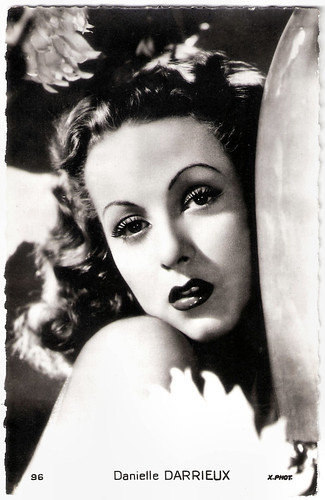
French postcard by Edition Chantal, Rueil, no. 96. Photo: x.phot.
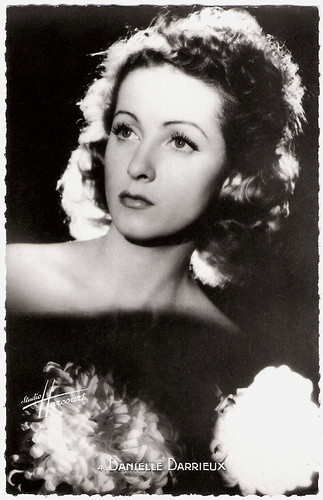
French postcard by S.E.R.P., Paris, no. 4. Photo: Studio Harcourt.
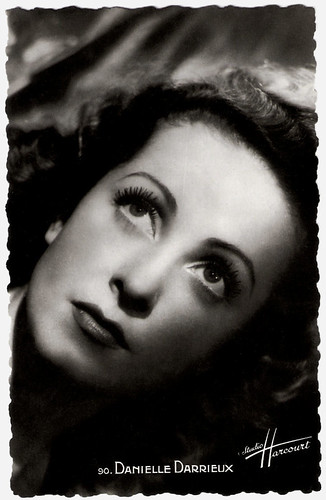
French postcard by SERP, Paris, no. 90. Photo: Studio Harcourt.
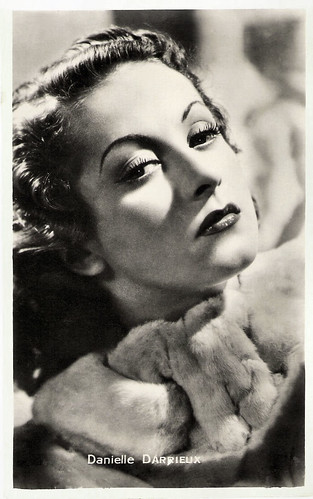
Dutch postcard.
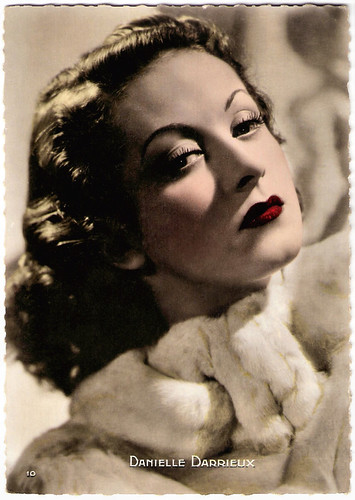
French postcard by Editions P.I., Paris, no. 10.
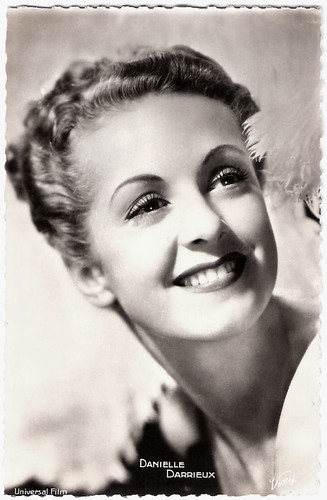
French postcard by Viny, no. 70. Photo: Universal Film.
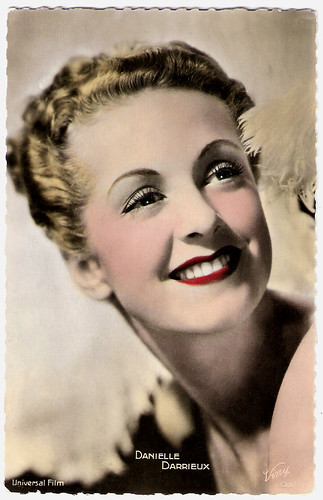
French postcard by Viny, no. 70. Photo: Universal Film.
Danielle Yvonne Marie Antoinette Darrieux was born in Bordeaux, France in 1917, but she was raised in Paris. She was the daughter of an army doctor who died when she was seven years old. Her brother was actor Olivier Darrieux.
Her family were keen music enthusiasts and Danielle studied the cello and piano at the Conservatoire de Musique (the Paris Conservatory). When she was only 14 she auditioned for a secondary role in the musical film Le Bal/The Ball (Wilhelm Thiele, 1931). Her beauty combined with her singing and dancing abilities got her the part.
Her performance as a headstrong teenager was impressive and the producer offered her a five-year contract. Her first romantic lead was in the backstage comedy La Crise est finie/The Crisis is Finished (Robert Siodmak, 1934) with Albert Préjean. She scored an international hit with the historical love-drama Mayerling (Anatole Litvak, 1936) in which she played doomed Baroness Marie Vetsera opposite Charles Boyer as Archduke Rudolph of Austria.
In 1935, Darrieux married director/screenwriter Henri Decoin, and they made six films together in the following years like Abus de Confiance/Abused Confidence (Henri Decoin, 1938) with Charles Vanel. Decoin encouraged her to try Hollywood, and in 1938 she signed with studio executive Joe Pasternak from Universal Studios to appear in the comedy The Rage of Paris (Henry Koster, 1938) opposite Douglas Fairbanks, Jr.
Both the film and Darrieux were well-received, but her stay in Hollywood proved short-lived. She quickly returned to Paris, where she continued to star in such major hits as Battement de coeur/Beating Heart (Henri Decoin, 1940) with Claude Dauphin.
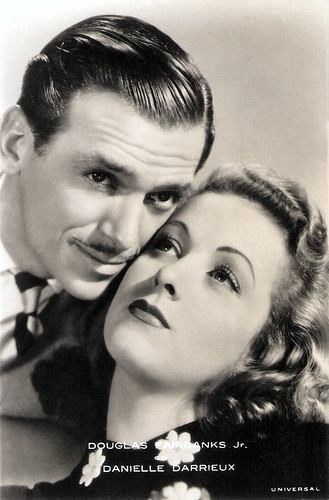
Dutch postcard by Sparo. Photo: Universal. Publicity still for The Rage of Paris (Henry Koster, 1938) with Douglas Fairbanks Jr.
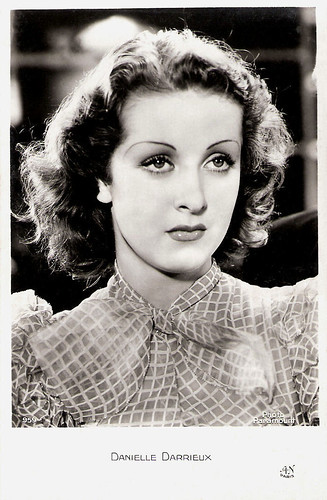
French postcard by A.N., Paris, no. 959. Photo: Paramount.
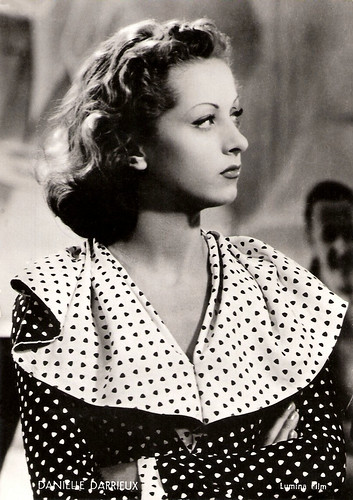
Dutch postcard by J.S.A. (J. Sleding, Amsterdam), no. 640/516. Photo: Lumina Film.
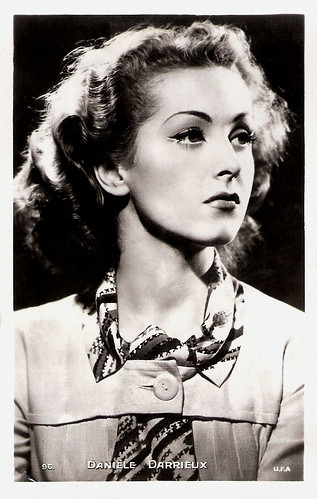
French postcard, no. 96. Photo: UFA.
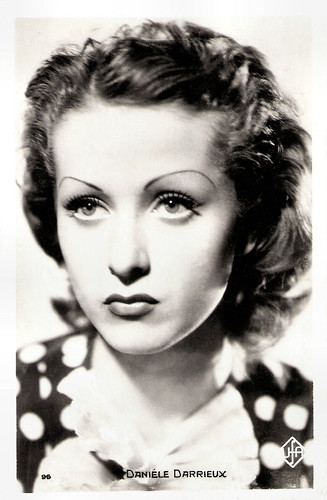
French postcard by Editions Chantal, no. 96. Photo: UFA.
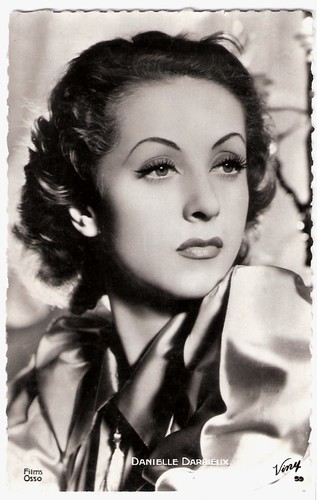
French postcard by Viny, no. 59. Photo: Films Osso.
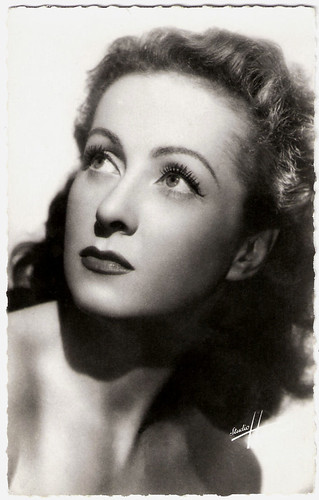
French postcard by Editions O.P., Paris, no. 1. Photo: Studio Harcourt.
After the occupation of France, Danielle Darrieux found herself working under the scrutiny of the new Nazi regime. She became the leading light of Continental, a Franco-German film company which was closely scrutinised by the Nazis. She distinguished herself in films such as Premier Rendez-Vous/Her First Affair (Henri Decoin, 1941).
After a visit to Germany, where she entertained the German troops, Darrieux’s popularity in France immediately plummeted and her name was placed on a death list of the French Resistance. Even when her death sentence was lifted after the war, it was several years before she had regained her former popularity.
After the war, she explained that Alfred Greven, the manager of Continental, had threatened to deport her brother Olivier to Germany. After her divorce from Henri Decoin in 1941, she married Dominican Republic diplomat and international jet-setter Porfirio Rubirosa in 1942. His anti-Nazi opinions resulted in his forced residence in Germany. Darrieux had accepted the promotional trip to Berlin in exchange for Rubirosa's liberation. They lived in Switzerland until the end of the war and divorced in 1947. A year later she married script-writer George Mitsikides and lived with him until his death in 1991. Her grand return came in 1949 with Claude Autant-Lara’s period farce Occupe-toi d'Amélie/Keep an Eye on Amelia (Claude Autant-Lara, 1949).
After La Ronde/Roundabout (Max Ophüls, 1950), Danielle Darrieux returned to Hollywood to appear as a French chanteuse in the MGM musical Rich, Young and Pretty (Norman Taurog, 1951) with Jane Powell. Joseph L. Mankiewicz then lured her to play the duplicitous lady friend of James Mason in the thriller 5 Fingers (Joseph L. Mankiewicz, 1952). Back home, she starred in Le Plaisir/Pleasure (Max Ophüls, 1952) with Madeleine Renaud, and opposite Charles Boyer and Vittorio de Sica in Madame de....../Diamond Earrings (Max Ophüls, 1953).
James Travers at Films de France: "The 1950s saw a marked change in Darrieux's on-screen persona. She was no longer the carefree ingenue of her pre-war years. She had become a sophisticated and passionate society woman, often appearing cold and calculating, but sometimes showing a tender tragic vulnerability. The film which defined Danielle Darrieux in this period was Madame de… (1953), in which she gave probably her best screen performance. This was the third of three films she appeared in which were directed by her fond admirer Max Ophüls."
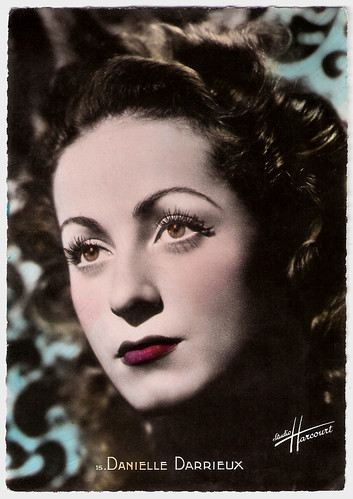
French postcard by S.E.R.P., Paris, no. 15. Photo: Studio Harcourt.
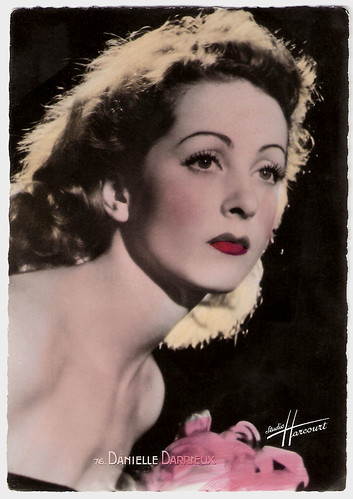
French postcard by S.E.R.P., Paris, no. 76. Photo: Studio Harcourt.
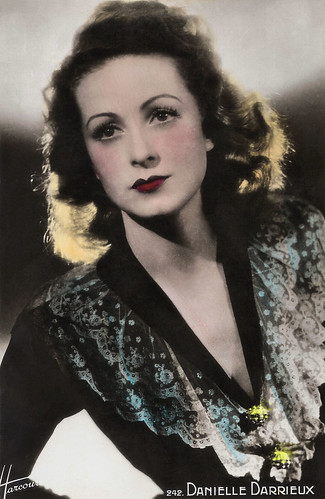
French postcard by S.E.R.P., Paris, no. 242. Photo: Studio Harcourt.
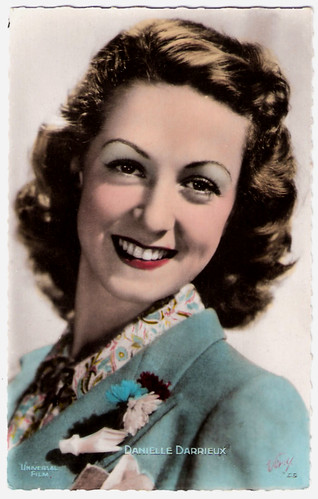
French postcard by Viny, no. 56. Photo: Universal Film.
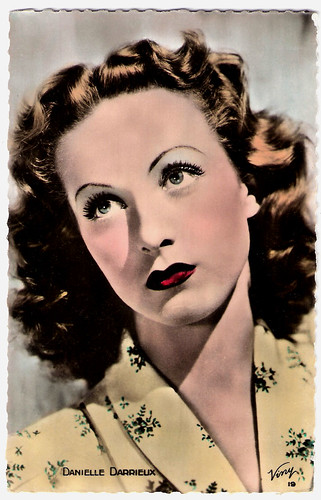
French postcard by Viny, no. 19.
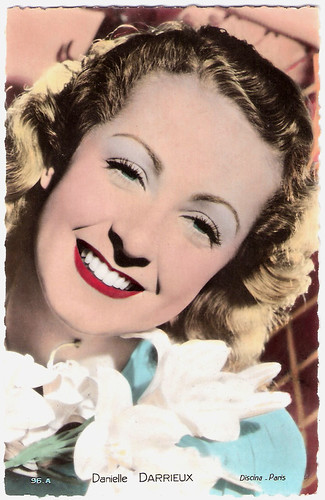
French postcard by Collection Chantal, Paris, no. 96 A. Photo: Discina, Paris.
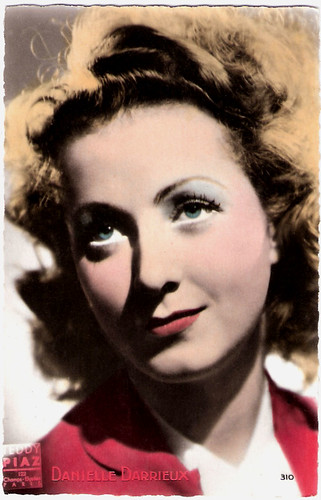
French postcard by Editions O.P., Paris, no. 310. Photo: Teddy Piaz, Paris.
During the 1950s, Danielle Darrieux also appeared in Le rouge et le noir/The Red and the Black (Claude Autant-Lara, 1954) opposite Gérard Philipe, and in L’amant de Lady Chatterley/Lady Chatterley's Lover (Marc Allégret, 1955) with Leo Genn. Due to its content, the latter film was banned by the Catholic censors in the United States.
She also played a supporting role in United Artists' epic Alexander the Great (Robert Rossen, 1957) starring Richard Burton. It was her last Hollywood production. Since then she continued to work in the European cinema.
In England, she starred opposite Kenneth More in The Greengage Summer (Lewis Gilbert, 1961), and in France, she appeared as the mother of Catherine Deneuve in five films: L’Homme à femmes/Ladies Man (Jacques Gérard Cornu, 1960), the classic musical Les Demoiselles de Rochefort/The Young Girls of Rochefort (Jacques Demy, 1967), the drama Le Lieu du crime/Scene of the Crime (André Téchiné, 1986), the comedy-murder-mystery 8 femmes/8 Women (François Ozon, 2002), and in Persepolis (Marjane Satrapi, 2007). This remarkable animated feature is based on a graphic novel of the same name about the impact of the Iranian Islamic revolution on a girl's life as she grows to adulthood.
The actress sang in concerts and cabarets in the 1960s, and in 1970 replaced Katharine Hepburn in the Broadway musical Coco. In the 1980s, Danielle Darrieux scored a significant success in a Paris staging of the film musical Gigi.
For her long service to the motion picture industry, she was given an Honorary César Award in 1985. Her final film was Pièce montée/The Wedding Cake (Denys Granier-Deferre, 2010) with Jérémie Renier. D.B. DuMonteil at IMDb: "Pièce Montée (Tiered cake) is a funny comedy, with some nostalgia and an attack on the bourgeoisie Chabrol would not disown. Its depiction of a wedding in France is marvellously precise, with all these smug people, wearing their Sunday's best, and taking photographs of each other." Madame Darrieux, rest in peace. Here at EFSP, we salute you.
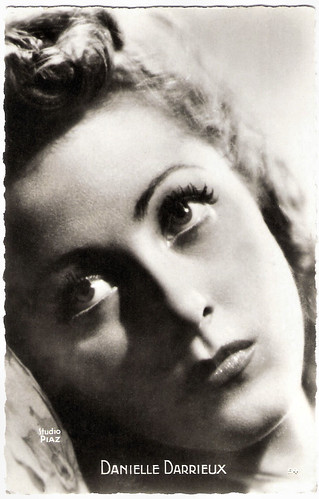
French postcard by Editions O.P., Paris, no. 54. Photo: Studio Piaz.
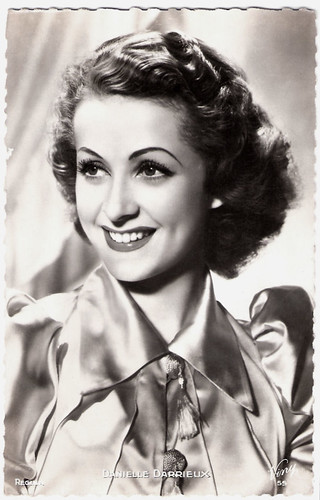
French postcard by Viny, no. 55. Photo: Regina.
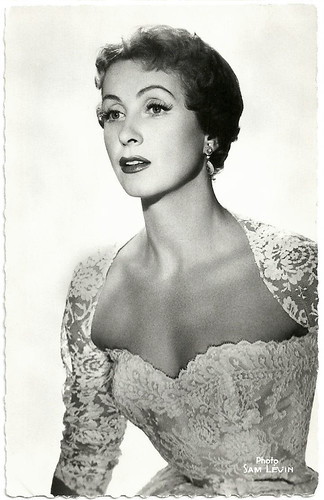
French postcard by Editions du Globe, Paris. Photo Sam Lévin.
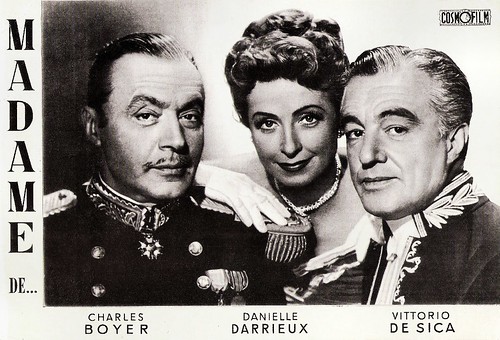
Spanish promotion card by Cosmofilm. Photo: publicity still for Madame de... (Max Ophüls, 1953) with Charles Boyer and Vittorio de Sica.
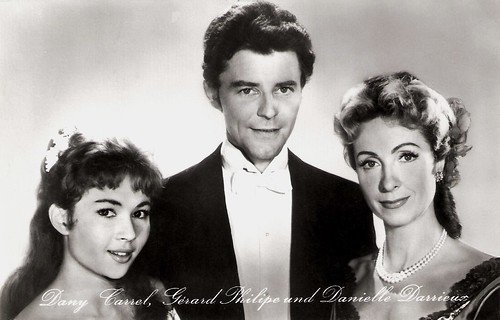
East-German postcard by VEB Progress Filmvertrieb, no. 1294, 1960. Photo: publicity still for Pot-Bouille/Lovers of Paris (Julien Duvivier, 1957) with Dany Carrel and Gérard Philipe.
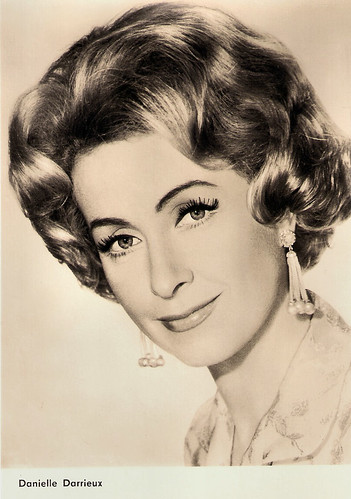
East-German postcard by VEB Progress Filmvertrieb, no. 2715, 1966.
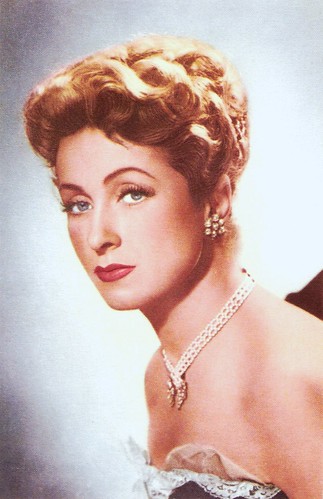
Vintage collectors card.
Trailer 8 femmes/8 Women (2002). Source: 2663KinkyCyborg (YouTube).
Sources: James Travers (French Films), Hal Erickson (AllMovie), Thanassos Agathos (IMDb), D.B. DuMonteil (IMDb), John Charles (TCM), AlloCiné (French), Wikipedia, and IMDb.
This post was last updated on 28 November 2023.

French postcard by Edition Chantal, Rueil, no. 96. Photo: x.phot.

French postcard by S.E.R.P., Paris, no. 4. Photo: Studio Harcourt.

French postcard by SERP, Paris, no. 90. Photo: Studio Harcourt.

Dutch postcard.

French postcard by Editions P.I., Paris, no. 10.

French postcard by Viny, no. 70. Photo: Universal Film.

French postcard by Viny, no. 70. Photo: Universal Film.
Romantic lead
Danielle Yvonne Marie Antoinette Darrieux was born in Bordeaux, France in 1917, but she was raised in Paris. She was the daughter of an army doctor who died when she was seven years old. Her brother was actor Olivier Darrieux.
Her family were keen music enthusiasts and Danielle studied the cello and piano at the Conservatoire de Musique (the Paris Conservatory). When she was only 14 she auditioned for a secondary role in the musical film Le Bal/The Ball (Wilhelm Thiele, 1931). Her beauty combined with her singing and dancing abilities got her the part.
Her performance as a headstrong teenager was impressive and the producer offered her a five-year contract. Her first romantic lead was in the backstage comedy La Crise est finie/The Crisis is Finished (Robert Siodmak, 1934) with Albert Préjean. She scored an international hit with the historical love-drama Mayerling (Anatole Litvak, 1936) in which she played doomed Baroness Marie Vetsera opposite Charles Boyer as Archduke Rudolph of Austria.
In 1935, Darrieux married director/screenwriter Henri Decoin, and they made six films together in the following years like Abus de Confiance/Abused Confidence (Henri Decoin, 1938) with Charles Vanel. Decoin encouraged her to try Hollywood, and in 1938 she signed with studio executive Joe Pasternak from Universal Studios to appear in the comedy The Rage of Paris (Henry Koster, 1938) opposite Douglas Fairbanks, Jr.
Both the film and Darrieux were well-received, but her stay in Hollywood proved short-lived. She quickly returned to Paris, where she continued to star in such major hits as Battement de coeur/Beating Heart (Henri Decoin, 1940) with Claude Dauphin.

Dutch postcard by Sparo. Photo: Universal. Publicity still for The Rage of Paris (Henry Koster, 1938) with Douglas Fairbanks Jr.

French postcard by A.N., Paris, no. 959. Photo: Paramount.

Dutch postcard by J.S.A. (J. Sleding, Amsterdam), no. 640/516. Photo: Lumina Film.

French postcard, no. 96. Photo: UFA.

French postcard by Editions Chantal, no. 96. Photo: UFA.

French postcard by Viny, no. 59. Photo: Films Osso.

French postcard by Editions O.P., Paris, no. 1. Photo: Studio Harcourt.
German occupation
After the occupation of France, Danielle Darrieux found herself working under the scrutiny of the new Nazi regime. She became the leading light of Continental, a Franco-German film company which was closely scrutinised by the Nazis. She distinguished herself in films such as Premier Rendez-Vous/Her First Affair (Henri Decoin, 1941).
After a visit to Germany, where she entertained the German troops, Darrieux’s popularity in France immediately plummeted and her name was placed on a death list of the French Resistance. Even when her death sentence was lifted after the war, it was several years before she had regained her former popularity.
After the war, she explained that Alfred Greven, the manager of Continental, had threatened to deport her brother Olivier to Germany. After her divorce from Henri Decoin in 1941, she married Dominican Republic diplomat and international jet-setter Porfirio Rubirosa in 1942. His anti-Nazi opinions resulted in his forced residence in Germany. Darrieux had accepted the promotional trip to Berlin in exchange for Rubirosa's liberation. They lived in Switzerland until the end of the war and divorced in 1947. A year later she married script-writer George Mitsikides and lived with him until his death in 1991. Her grand return came in 1949 with Claude Autant-Lara’s period farce Occupe-toi d'Amélie/Keep an Eye on Amelia (Claude Autant-Lara, 1949).
After La Ronde/Roundabout (Max Ophüls, 1950), Danielle Darrieux returned to Hollywood to appear as a French chanteuse in the MGM musical Rich, Young and Pretty (Norman Taurog, 1951) with Jane Powell. Joseph L. Mankiewicz then lured her to play the duplicitous lady friend of James Mason in the thriller 5 Fingers (Joseph L. Mankiewicz, 1952). Back home, she starred in Le Plaisir/Pleasure (Max Ophüls, 1952) with Madeleine Renaud, and opposite Charles Boyer and Vittorio de Sica in Madame de....../Diamond Earrings (Max Ophüls, 1953).
James Travers at Films de France: "The 1950s saw a marked change in Darrieux's on-screen persona. She was no longer the carefree ingenue of her pre-war years. She had become a sophisticated and passionate society woman, often appearing cold and calculating, but sometimes showing a tender tragic vulnerability. The film which defined Danielle Darrieux in this period was Madame de… (1953), in which she gave probably her best screen performance. This was the third of three films she appeared in which were directed by her fond admirer Max Ophüls."

French postcard by S.E.R.P., Paris, no. 15. Photo: Studio Harcourt.

French postcard by S.E.R.P., Paris, no. 76. Photo: Studio Harcourt.

French postcard by S.E.R.P., Paris, no. 242. Photo: Studio Harcourt.

French postcard by Viny, no. 56. Photo: Universal Film.

French postcard by Viny, no. 19.

French postcard by Collection Chantal, Paris, no. 96 A. Photo: Discina, Paris.

French postcard by Editions O.P., Paris, no. 310. Photo: Teddy Piaz, Paris.
Lady Chatterley's lover
During the 1950s, Danielle Darrieux also appeared in Le rouge et le noir/The Red and the Black (Claude Autant-Lara, 1954) opposite Gérard Philipe, and in L’amant de Lady Chatterley/Lady Chatterley's Lover (Marc Allégret, 1955) with Leo Genn. Due to its content, the latter film was banned by the Catholic censors in the United States.
She also played a supporting role in United Artists' epic Alexander the Great (Robert Rossen, 1957) starring Richard Burton. It was her last Hollywood production. Since then she continued to work in the European cinema.
In England, she starred opposite Kenneth More in The Greengage Summer (Lewis Gilbert, 1961), and in France, she appeared as the mother of Catherine Deneuve in five films: L’Homme à femmes/Ladies Man (Jacques Gérard Cornu, 1960), the classic musical Les Demoiselles de Rochefort/The Young Girls of Rochefort (Jacques Demy, 1967), the drama Le Lieu du crime/Scene of the Crime (André Téchiné, 1986), the comedy-murder-mystery 8 femmes/8 Women (François Ozon, 2002), and in Persepolis (Marjane Satrapi, 2007). This remarkable animated feature is based on a graphic novel of the same name about the impact of the Iranian Islamic revolution on a girl's life as she grows to adulthood.
The actress sang in concerts and cabarets in the 1960s, and in 1970 replaced Katharine Hepburn in the Broadway musical Coco. In the 1980s, Danielle Darrieux scored a significant success in a Paris staging of the film musical Gigi.
For her long service to the motion picture industry, she was given an Honorary César Award in 1985. Her final film was Pièce montée/The Wedding Cake (Denys Granier-Deferre, 2010) with Jérémie Renier. D.B. DuMonteil at IMDb: "Pièce Montée (Tiered cake) is a funny comedy, with some nostalgia and an attack on the bourgeoisie Chabrol would not disown. Its depiction of a wedding in France is marvellously precise, with all these smug people, wearing their Sunday's best, and taking photographs of each other." Madame Darrieux, rest in peace. Here at EFSP, we salute you.

French postcard by Editions O.P., Paris, no. 54. Photo: Studio Piaz.

French postcard by Viny, no. 55. Photo: Regina.

French postcard by Editions du Globe, Paris. Photo Sam Lévin.

Spanish promotion card by Cosmofilm. Photo: publicity still for Madame de... (Max Ophüls, 1953) with Charles Boyer and Vittorio de Sica.

East-German postcard by VEB Progress Filmvertrieb, no. 1294, 1960. Photo: publicity still for Pot-Bouille/Lovers of Paris (Julien Duvivier, 1957) with Dany Carrel and Gérard Philipe.

East-German postcard by VEB Progress Filmvertrieb, no. 2715, 1966.

Vintage collectors card.
Trailer 8 femmes/8 Women (2002). Source: 2663KinkyCyborg (YouTube).
Sources: James Travers (French Films), Hal Erickson (AllMovie), Thanassos Agathos (IMDb), D.B. DuMonteil (IMDb), John Charles (TCM), AlloCiné (French), Wikipedia, and IMDb.
This post was last updated on 28 November 2023.
No comments:
Post a Comment